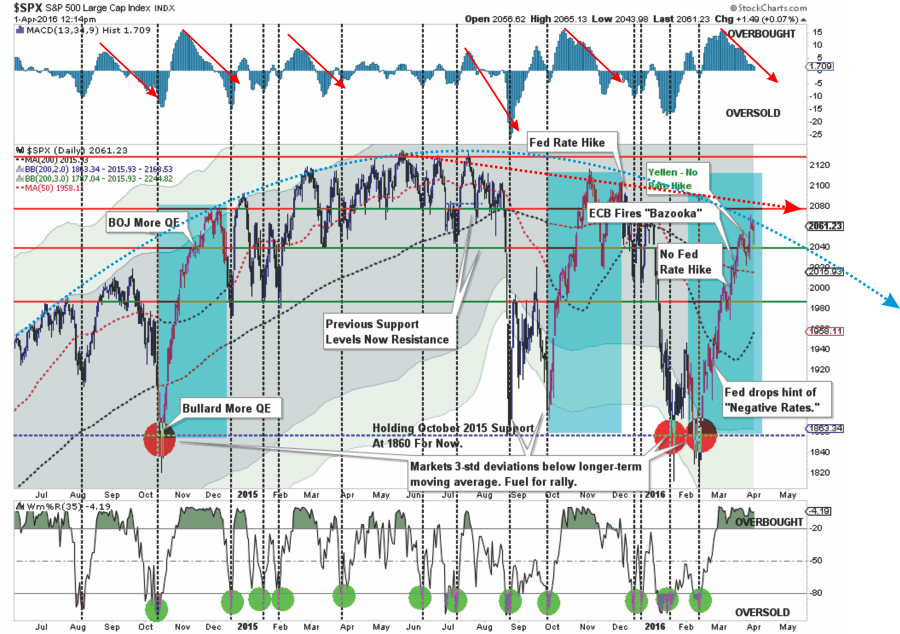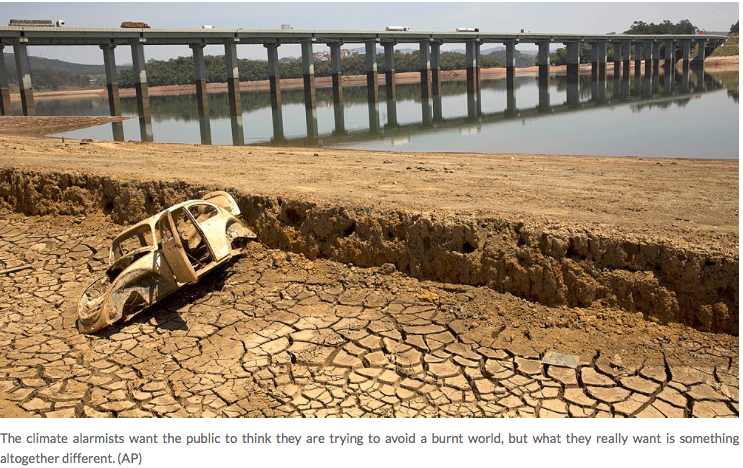Economic Outlook
A good bit has happened over the last couple of weeks. The S&P 500 staged a sharp recovery from February closing lows due to repeated Central Bank actions during the month as well as an expected reflex rally fueled by short-covering. On a short term basis, the technical backdrop has improved markedly, but was it enough to change the longer-term trend of the markets from bearish back to bullish. This is the topic we will directly tackle this week.
While allocations have been very conservative since last May, avoiding the ensuing volatile declines last summer and the start of this year, I have repeatedly stated that interventions by Central Banks could nullify the “bear case” in the short-term.
Let’s start with a short-term (daily) view and update the previous observations.



It is such a big issue, and so expensive it pays to ask what is it all about, and what effect on the markets and economy can you expect. Starting off with a quote – Money Talks Editor:
In the words of former United Nations climate official Ottmar Edenhofer:
“One has to free oneself from the illusion that international climate policy is environmental policy. This has almost nothing to do with the environmental policy anymore, with problems such as deforestation or the ozone hole,” said Edenhofer, who co-chaired the U.N.’s Intergovernmental Panel on Climate Change working group on Mitigation of Climate Change from 2008 to 2015.
So what is the goal of environmental policy?
“We redistribute de facto the world’s wealth by climate policy,” said Edenhofer.
Another Climate Alarmist Admits Real Motive Behind Warming Scare
Fraud: While the global warming alarmists have done a good job of spreading fright, they haven’t been so good at hiding their real motivation. Yet another one has slipped up and revealed the catalyst driving the climate scare.
We have been told now for almost three decades that man has to change his ways or his fossil-fuel emissions will scorch Earth with catastrophic warming. Scientists, politicians and activists have maintained the narrative that their concern is only about caring for our planet and its inhabitants. But this is simply not true. The narrative is a ruse. They are after something entirely different.
If they were honest, the climate alarmists would admit that they are not working feverishly to hold down global temperatures — they would acknowledge that they are instead consumed with the goal of holding down capitalism and establishing a global welfare state.
Have doubts? Then listen to the words of former United Nations climate official Ottmar Edenhofer:
“One has to free oneself from the illusion that international climate policy is environmental policy. This has almost nothing to do with the environmental policy anymore, with problems such as deforestation or the ozone hole,” said Edenhofer, who co-chaired the U.N.’s Intergovernmental Panel on Climate Change working group on Mitigation of Climate Change from 2008 to 2015.
So what is the goal of environmental policy?
“We redistribute de facto the world’s wealth by climate policy,” said Edenhofer.
For those who want to believe that maybe Edenhofer just misspoke and doesn’t really mean that, consider that a little more than five years ago he also said that “the next world climate summit in Cancun is actually an economy summit during which the distribution of the world’s resources will be negotiated.”
Mad as they are, Edenhofer’s comments are nevertheless consistent with other alarmists who have spilled the movement’s dirty secret. Last year, Christiana Figueres, executive secretary of U.N.’s Framework Convention on Climate Change, made a similar statement.
“This is the first time in the history of mankind that we are setting ourselves the task of intentionally, within a defined period of time, to change the economic development model that has been reigning for at least 150 years, since the Industrial Revolution,” she said in anticipation of last year’s Paris climate summit.
“This is probably the most difficult task we have ever given ourselves, which is to intentionally transform the economic development model for the first time in human history.”
The plan is to allow Third World countries to emit as much carbon dioxide as they wish — because, as Edenhofer said, “in order to get rich one has to burn coal, oil or gas” — while at the same time restricting emissions in advanced nations. This will, of course, choke economic growth in developed nations, but they deserve that fate as they “have basically expropriated the atmosphere of the world community,” he said. The fanaticism runs so deep that one professor has even suggested that we need to plunge ourselves into a depression to fight global warming.
Perhaps Naomi Klein summed up best what the warming the fuss is all about in her book “This Changes Everything: Capitalism vs. the Climate.”
“What if global warming isn’t only a crisis?” Klein asks in a preview of a documentary inspired by her book. “What if it’s the best chance we’re ever going to get to build a better world?”
In her mind, the world has to “change, or be changed” because an “economic system” — meaning free-market capitalism — has caused environmental “wreckage.”
This is how the global warming alarmist community thinks. It wants to frighten, intimidate and then assume command. It needs a “crisis” to take advantage of, a hobgoblin to menace the people, so that they will beg for protection from the imaginary threat. The alarmists’ “better world” is one in which they rule a global welfare state. They’ve admitted this themselves.

 The shouts of warning are finally starting to come out from official bodies. Since the collapse of the oil and gas market, we have been writing about the fact that we haven’t seen the worst yet.
The shouts of warning are finally starting to come out from official bodies. Since the collapse of the oil and gas market, we have been writing about the fact that we haven’t seen the worst yet.
As I have previously written, Canada and Russia are two countries that have been absolutely devastated by the crashing oil markets. The oil and gas crash has racked the Canadian economy and resulted in massive layoffs in the industry and those that support it. Yet the ripple effect has yet to take full effect and the corresponding regulatory bodies are just starting to take notice.
The Canadian banking sector, along with the Commodities sector, constitutes a massive part of the Canadian economy. Therefore, it is not surprising to learn that the former is now controlled by the latter and in a major way.
Alarm bells are ringing as growing unease settles across the Canadian banking sector. They know that defaults are coming in a massive way. Most people employed in the commodities sector enjoyed large incomes and therefore they splurged on large and expensive toys to go along with their income, as many people do. Unfortunately, this means another thing – large loans, which are becoming more and more unlikely to be repaid.
The Wall Street Journal is now catching up with this reality as well. In a recent article they highlighted that the Canadian banking sector is horribly under-funded in the face of this growing crisis and points out that Canada’s banking regulators are even taking notice.
“Canada’s banking regulator is urging the country’s major banks to review their accounting practices to ensure they have sufficient reserves as the commodity-price collapse takes a toll on the economy.”
“We want them to take a good look at their accounting practices,” said Superintendent of Financial Institutions Jeremy Rudin. “They should support loss-absorbing capacity and the ability to manage through difficult times in general,” he added.
Regulators are taking notice and for good reason. The amount of exposure that the Canadian banking sector has to the flailing oil and gas markets is massive, equating to roughly C$107 billion!
People should be even more startled by the fact that this industry is nowhere near starting up again, even if prices were to recover tomorrow. It would take time to rehire and restart the production that has been shut down.
This current reality means that this ticking time bomb is set to explode in the hands of the Canadian Banking sector and thus cause a ripple effect across the Canadian economy and undoubtedly across the highly intertwined Western banking structure.
Could Canadian banks be the next spark that lights the match? Will this economic situation be the catalyst that sends us plummeting into the next major financial crisis? It is incredibly possible yet unknown. Sadly, the world is facing many scenarios that could cause similar turmoil.
The views and opinions expressed in this material are those of the author as of the publication date, are subject to change and may not necessarily reflect the opinions of Sprott Money Ltd. Sprott Money does not guarantee the accuracy, completeness, timeliness and reliability of the information or any results from its use.

 Chang and Eng were the first internationally known “Siamese twins”, as a result of their having been exhibited worldwide. Although each had a complete body, they were joined together at the sternum.
Chang and Eng were the first internationally known “Siamese twins”, as a result of their having been exhibited worldwide. Although each had a complete body, they were joined together at the sternum.
In 1870, Chang suffered a stroke and his health deteriorated over the next four years. In 1874, at age sixty-two, he developed bronchitis and died. His brother Eng realised immediately that his continued attachment to his brother meant that he was next. Although he was separated from his twin in an emergency operation, Eng died hours later. He left the problem too long and paid with his life.
Just as with Siamese twins, it’s a risky proposition for one country to have too much dependency on another. If a visitor to Uruguay were to visit a supermarket and examine the origin of the products by reading labels, he would find that Uruguay produces 90% of the food it consumes. In Cuba, however, we read the labels on packaging and see that the great majority of packaged foods comes from Mexico. This suggests that, should food production diminish in Mexico, or should there be political turmoil or shipping problems, Cuba could face significant problems in feeding its people.
A similar problem exists in Canada. Roughly 70% of Canada’s export product is sold to the US, whilst over 60% of its imports come from the US. Of particular concern is oil. The Canadian oil industry cannot survive without the US, as over 99% of its oil production is shipped there. Unless oil returns to a level over $60/bbl fairly soon (don’t hold your breath), and the US doesn’t stop dithering over the pipeline issue, not only will Canadian jobs and oil sales suffer, but entire companies are likely to fail.
Regarding banking, Canadians take pride in their system and rightfully so, as Canadian banks have been nowhere near as cavalier as American banks in recent history. However, without transfers between the two countries (particularly between New York and Toronto), their banks would quickly find themselves in peril. If the US were to find itself in an economic crisis, as appears likely, Canada’s banks would also be in crisis.
In 2007, the US experienced a collapse in its real estate market. Many Canadians felt that they were in better shape, as they did not experience a similar collapse. Unfortunately, though, the Canadian housing bubble continued to grow. Over the last ten years, inflation-adjusted residential real estate prices in Canada have increased by 49.3%, whilst US and EU numbers have gone down. House buyers in Vancouver, Calgary and Toronto are way overdue for a major fall. All that would be needed would be a rise in interest rates to prick the bubble. (Canadian Real Estate values must decline by 35.1% just to be equal to the US.)
Other sectors of the economy, however, have already taken a hit from the North American recession. Jobs have disappeared and wages have not kept abreast of increasing costs. Households have made up the difference with debt, and have committed themselves to a phenomenal level of borrowing. Indebtedness in relation to income has increased dramatically.
All the above (and other factors too numerous to mention) serve as a reminder that, should the US take a fall economically, its Siamese twin will be in for problems that will mirror those of its brother to the south.
If ever there were a time when the cavalry needs to ride in and save the day, it would be over the next year or two. Unfortunately, the opposite is likely to occur. Canadians have recently opted to elect pinup-boy Justin Trudeau as its Prime Minister, who has already promised to steer Canada further into taxation and debt.
To show he means business, he has sold off virtually all of Canada’s three tonnes of gold reserves.
Those of us who are British are still smarting over UK Prime Minister Gordon Brown’s sale of Britain’s gold at the bottom of the market (just under $300) at the turn of the millennium. Mister Trudeau has likely accomplished a similar feat, if it proves true that gold is now at the bottom of its four-year correction and is poised for its next bull market.
In my own country, I deal regularly with Canadian investors, who often say something to the effect of, “The US is headed off the cliff. I know we’ll feel the heat, but thank God, we’re more conservative and it won’t be too bad for us.”
It’s true that in several ways, Canada hasn’t been as stupid as the US, but (especially with Mister Trudeau now in the driver’s seat), as events unfold in the US, they may well make up for lost time. It’s entirely possible that the new Canadian government will shoot itself in the foot repeatedly until they catch up with the US. However, even at best, when the US pulls the “flush” handle on their economy, Canada will caught in the maelstrom.
In 1874, when Chang and Eng died, people queried, “Why didn’t they have the surgery to separate themselves years previously, when it would have assured the longevity of one if the other died?”
Of course, hindsight is 20/20 and it’s no different for nations. Rarely does any nation take the bitter pill of diversifying, prior to a crisis. Almost invariably the “Eng” nation procrastinates until it’s too late and it follows its brother into crisis and/or collapse.
If the reader finds himself nodding at this observation, he may question whether he, as an individual, is prepared. Today, a quiet exodus of Americans has begun. Increasing numbers are diversifying themselves out of the US; moving their wealth (and often themselves) out of their home country so that they won’t be casualties when the odiferous effluvium hits the fan.
However, fewer Canadians share their concern. We’re seeing less of an exodus from Canada. Do they have reason to feel less threatened? Well, certainly we shall see a collapse in several of the world’s most prominent jurisdictions in future. If we base our projections on the fundamentals alone, we might see a crash in China, one in Japan, the EU, then America. Canada might well come in at the end.
However, the fundamentals certainly indicate that all will be hard hit at one point or another and it’s not always the fundamentals that set the order. In the end, it’s generally a series of black swan events that trigger the inevitable, sometimes resulting in a less logical order.
Black swans are, by definition, unpredictable. It may turn out that oil alone could trigger an early fall for Canada. But our concern here should not be over which jurisdiction hits the skids first. Our concern should be the inevitability of the events.
It should be said that it’s far too late in the game to perform surgery that would assure a healthy Canada, if and when the US takes its dive. It’s not, however, too late for Canadians to create individual diversification of investment. They may still sell off their homes and choose to rent for the next few years (better to lose a little than a lot). They may also move their money out of financial institutions and into precious metals in an offshore depository. And if they wish to own property, they might choose to buy land or built property in a jurisdiction that promises to survive the coming economic debacle better than their home country.
There are certainly means and there may be adequate time to avoid the same outcome as Eng.
The author is not affiliated with, endorsed or sponsored by Sprott Money Ltd. The views and opinions expressed in this material are those of the author or guest speaker, are subject to change and may not necessarily reflect the opinions of Sprott Money Ltd. Sprott Money does not guarantee the accuracy, completeness, timeliness and reliability of the information or any results from its use.

- Death toll climbs to at least 34 in attacks on Brussels airport and metro station.
- Dozens injured in what prosecutors say was a suicide bombing.
- All public transport shut down in Brussels.
- Authorities launch massive police operation.
- Belgian prosecutors confirm the explosions were terrorist attacks.
- Belgium raised its terror alert to its highest level.












